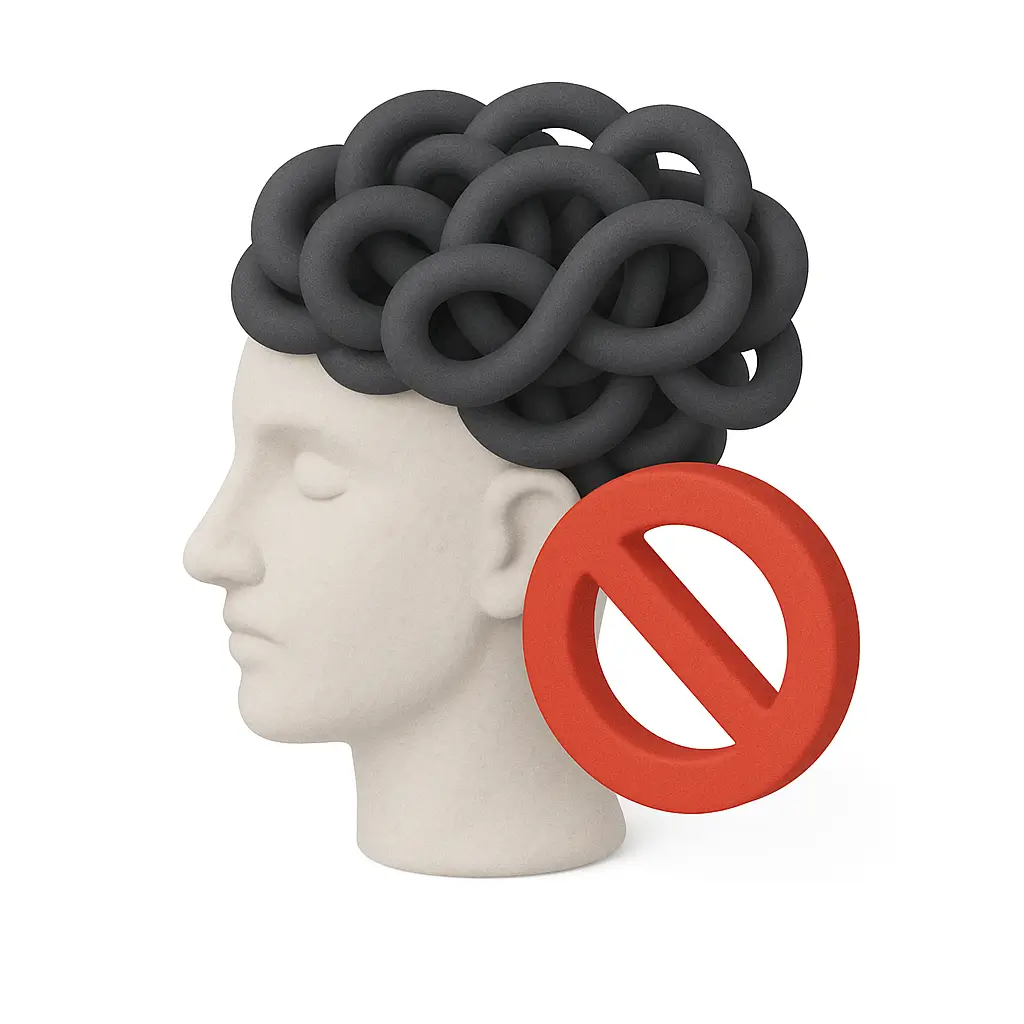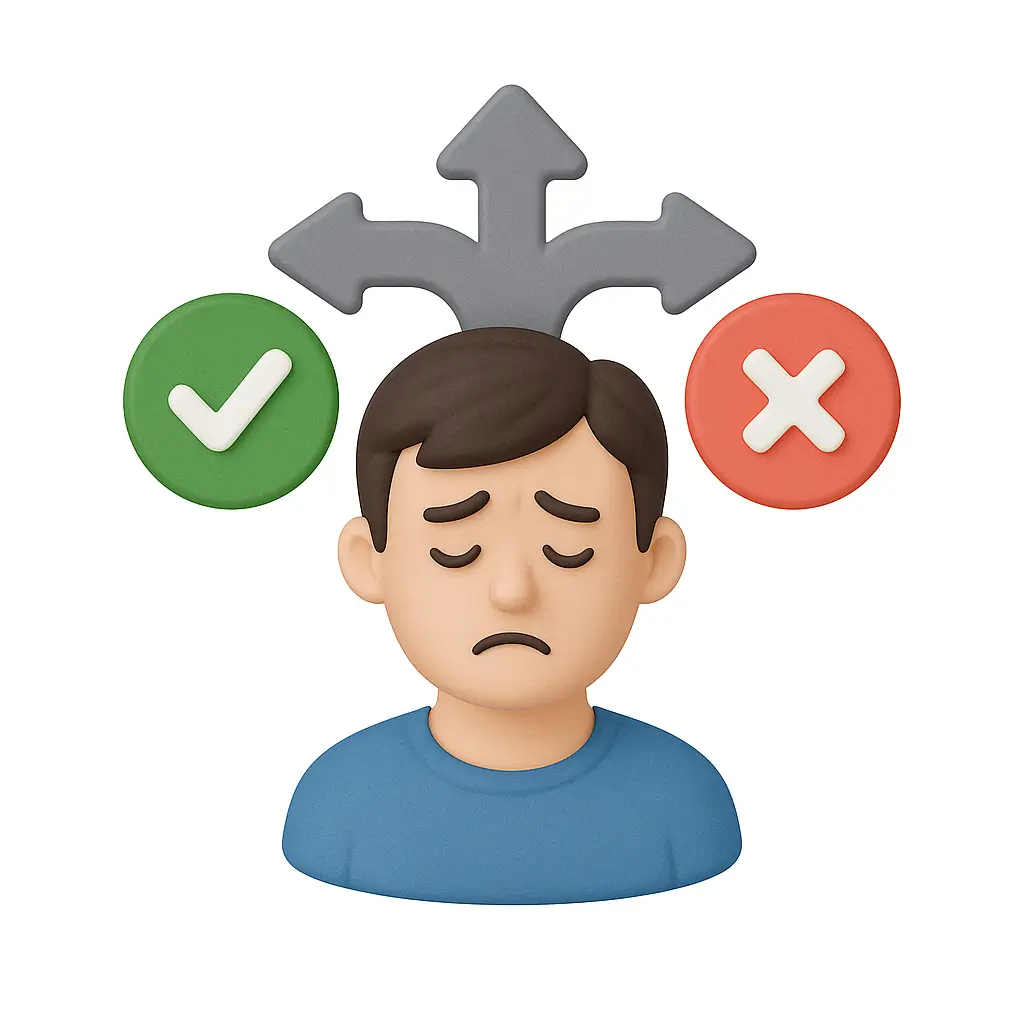Overthinking Detox
Simple, science-backed ways to stop mental loops and reclaim calm.
June 30, 2025 · 6 min read

🐹 The mental hamster wheel
It's 2 AM. Emma lies in bed replaying today's presentation.
Did I talk too fast? Why did Mark look confused? Should I have used different slides?
Her mind spins through scenarios that already happened. Then jumps to tomorrow's meeting. Then next week's deadline.
The hamster wheel keeps turning.
Overthinking feels productive. Like you're solving problems or preparing for challenges. But it's actually mental quicksand. The more you struggle, the deeper you sink.
What overthinking really is
Overthinking isn't careful analysis. It's repetitive, unproductive mental loops that create anxiety without generating solutions.
Signs you're overthinking:
-
Replaying conversations hours later
-
Creating worst-case scenarios in your head
-
Second-guessing decisions you've already made
-
Feeling paralyzed by too many options
Your brain thinks it's helping. It's actually hurting.
The hidden cost of mental loops
Overthinking doesn't just waste time. It rewires your brain for anxiety.
What happens when you overthink:
-
Stress hormones flood your system
-
Sleep quality decreases
-
Decision-making ability weakens
-
Creativity gets blocked
Each mental loop strengthens neural pathways for worry. You literally train your brain to overthink more.
Why we get stuck in our heads
Fear of Making Mistakes
Your brain evolved to spot threats. In modern life, it treats potential embarrassment like physical danger. So it runs endless simulations trying to prevent problems.
Illusion of Control
Thinking about something feels like doing something about it. Your mind tricks you into believing that more analysis equals better outcomes.
Perfectionism
If you can just think through every angle, you'll make the perfect choice. Except perfect choices don't exist, and the search for them creates paralysis.
A two‑minute reality check
When you catch yourself overthinking, ask:
-
Can I do something about this right now?
-
Will this matter in five years?
If the answer to both is no, you're wasting mental energy.
If you can take action, do it. If not, let it go.
How to stop overthinking
The Brain Dump
Set a timer for 10 minutes. Write down everything swirling in your head. Don't edit or organize. Just dump it all onto paper.
This gets thoughts out of your mind and onto something external. Often, seeing worries written down reveals how unrealistic they are.
The 5-4-3-2-1 Grounding Technique
When your mind starts racing, engage your senses:
- 5 things you can see
- 4 things you can touch
- 3 things you can hear
- 2 things you can smell
- 1 thing you can taste
This pulls you out of your head and into the present moment.
The Decision Deadline
Give yourself a specific time limit for decisions. Small choices get 5 minutes. Medium ones get a day. Big ones get a week.
When time's up, choose based on available information. Perfect clarity rarely comes from more thinking.
The Worry Window
Schedule 15 minutes daily for worrying. When anxious thoughts arise outside this window, tell yourself: "I'll think about this during worry time."
This contains overthinking to a specific period instead of letting it invade your entire day.
Break the rumination cycle
Change Your Physical State
Overthinking happens when you're stuck in one position. Move your body to shift your mind:
- Take a walk
- Do jumping jacks
- Change rooms
- Go outside
Physical movement interrupts mental loops.
Use the "So What?" Method
Keep asking "So what?" until you reach the real fear:
"I stumbled during my presentation."
So what?
"People might think I'm unprepared."
So what?
"They might not trust my expertise."
So what?
"I might lose credibility at work."
Now you've identified the real concern. You can address fear of losing credibility directly instead of replaying the stumble endlessly.
Practice the Pause
Between trigger and thought spiral, there's a moment of choice. Practice catching that moment:
- Notice the overthinking starting
- Pause before diving in
- Choose a different response
This takes practice, but it's the most powerful skill you can develop.
The power of 'good enough' decisions
Most decisions are reversible. Most mistakes are fixable. Most problems are smaller than they seem.
Ask yourself:
- Is this decision reversible?
- What's the worst realistic outcome?
- Will I remember this in a month?
Often, making any decision is better than making no decision.
Build your mental firewall
Set Information Boundaries
Limit inputs that fuel overthinking:
- Check news once daily, not constantly
- Unfollow social accounts that create comparison
- Set specific times for checking work messages
Less input means less to overthink about.
Create Thinking Rituals
Designate specific times and places for deep thinking. This prevents random thoughts from hijacking your entire day.
Example ritual:
- Sunday evening planning session
- Morning coffee reflection time
- End-of-day review
Outside these times, redirect overthinking thoughts to your designated thinking periods.
Practice Thought Labeling
When you notice overthinking, simply label it: "I'm having overthinking thoughts right now."
This creates distance between you and your thoughts. You're not your thoughts. You're the observer of your thoughts.
Your detox plan
Week 1: Practice the 2-minute reality check daily
Week 2: Add the 5-4-3-2-1 grounding technique
Week 3: Implement worry windows
Week 4: Create thinking rituals
Start with one technique. Master it before adding others.
When deeper thinking helps
Not all deep thinking is bad. Overthinking becomes helpful when it:
- Generates specific action steps
- Leads to concrete decisions
- Helps you learn from experiences
- Prepares you for important events
The key is knowing when to think and when to stop.
The freedom on the other side
Imagine having mental space for creativity instead of worry. Energy for action instead of analysis. Peace instead of constant mental chatter.
This isn't about becoming careless. It's about becoming intentional with your mental energy.
Your thoughts don't control you. You control your thoughts.
The hamster wheel stops when you decide to step off.
---
What's one thought loop you could break today? Start there.

